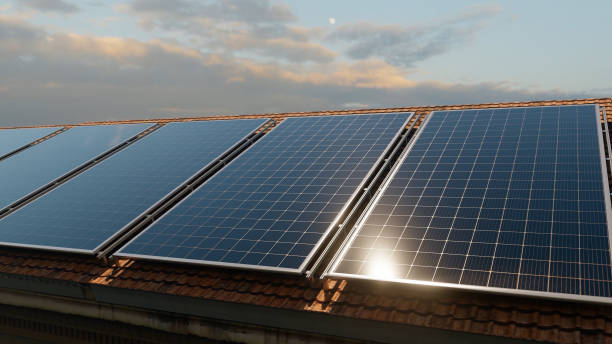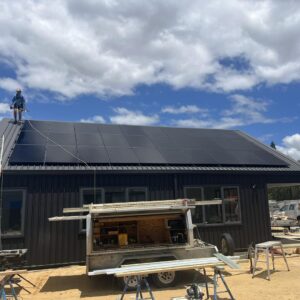As energy costs continue to climb and grid access becomes less reliable in rural and remote areas, more homeowners in Southwest WA are turning their attention to off-grid solar systems. But despite the growing popularity, there are still plenty of misconceptions that create hesitation for those considering energy independence.
If you’ve searched online for “off grid solar Margaret River?” or heard conflicting information about what’s involved, this blog is for you. We’re here to set the record straight and debunk the top five myths about off-grid solar systems, especially as they apply to regional and remote properties in Western Australia.
With decades of local expertise, MaxSolar’s off-grid solar solutions are specifically designed for Margaret River, Nannup, and the broader South West region. Let’s explore the truth behind the myths and help you make an informed decision for your property and lifestyle.
Myth 1: Off-Grid Solar Is Only for “Extreme” Remote Properties
It’s true that off-grid solar was once seen as a solution only for isolated stations or bushland cabins with no access to the power grid. But times have changed.
Today, many homeowners in semi-rural areas, coastal towns, and even peri-urban properties are choosing to go off-grid voluntarily, for reasons ranging from rising electricity prices and unreliable supply to the desire for greater control and sustainability.
WA-specific example:
In regions around Donnybrook and Bridgetown, even where grid access is technically possible, connection costs can exceed $30,000–$50,000, making off-grid solar the more practical and affordable choice. Plus, properties that already have some renewable infrastructures (like tanks or generators) are often ideal candidates.
Off-grid isn’t just for the outback anymore; it’s a smart alternative for anyone who wants independence and long-term savings.
Myth 2: Off-Grid Systems Are Too Expensive to Be Worth It
There’s a common belief that going off-grid costs hundreds of thousands of dollars and that it takes decades to see a return on investment. While early systems may have been expensive and inefficient, modern technology has changed the game entirely.
Yes, an off-grid system typically has a higher upfront cost than a basic grid-connected solar system. This is because you’re paying not only for panels and an inverter, but also for battery storage, a backup generator, and off-grid controls to ensure constant energy supply.
However, those costs need to be compared with:
- Long-term grid electricity bills
- Connection fees in rural zones
- Maintenance of poles and wires
- The increasing volatility of electricity prices
In fact, with WA-specific rebates and subsidies, off-grid systems in Southwest WA can now be more affordable than ever. At MaxSolar, we help homeowners navigate rebate programs and customise packages that make energy independence not just possible, but practical.
To learn more about how we tailor pricing for your location and usage needs, visit our about page for a deeper look at our experience and values.
Myth 3: You’ll Run Out of Power Without the Grid
This myth is one of the most common, and most easily debunked. The idea that you’ll be left in the dark during cloudy days or high-usage periods assumes that off-grid systems are unstable or poorly designed.
The reality is, a properly sized off-grid system with adequate battery backup and a generator is highly reliable. Your system is built around your household’s energy profile and designed to store enough power to get through overcast days, higher-demand usage, and even seasonal dips in production.
How off-grid systems manage supply:
- Lithium battery banks (like Tesla Powerwall or BYD) store excess daytime energy
- Backup diesel or LPG generators automatically top up the system when needed
- Energy management software ensures optimal usage and storage balancing
- Load-shifting strategies help avoid overloading at peak times
At MaxSolar, we conduct an energy usage audit and weather simulation based on Southwest WA conditions to ensure your system always meets demand, even through storms or winter weeks.
Myth 4: Off-Grid Systems Are Hard to Maintain
Many people assume that because off-grid systems are independent, they require constant upkeep, technical knowledge, or frequent servicing. While earlier models may have been more labour-intensive, today’s systems are designed for minimal maintenance and maximum reliability.
Modern off-grid solar systems include features such as:
- Remote monitoring via apps or cloud dashboards
- Auto-generator start functions
- Long-life batteries with 10 to 15-year warranties
- Weather-resistant, low-maintenance panels
Routine maintenance typically includes:
- Panel cleaning a few times per year (especially in coastal areas)
- Occasional battery health checks
- Annual or biannual inspections by a qualified technician
It’s comparable to maintaining a hot water system or an air conditioner, and in many cases, easier.
Our customers often comment on how surprisingly “hands-off” their systems are. Once installed, they just work quietly in the background, powering your home and reducing your energy worries.
Myth 5: Off-Grid Homes Don’t Qualify for Rebates or Support
Another major misconception is that if you’re not connected to the grid, you don’t qualify for solar subsidies, STCs (Small-Scale Technology Certificates), or other incentive programs.
This is incorrect.
Off-grid solar systems do qualify for federal rebates under the Small-scale Renewable Energy Scheme (SRES), provided they’re installed by a Solar Accreditation Australia (SAA) accredited installer and meet the size and efficiency requirements. These rebates can reduce upfront costs by $3,000–$6,000 or more, depending on system size.
Additionally:
- Off-grid households may qualify for local council grants (varies by LGA)
- WA Government incentives for battery storage and energy resilience may also apply
- Businesses running off-grid setups may be eligible for tax incentives and depreciation
At MaxSolar, we handle all rebate applications on your behalf, ensuring you don’t miss a cent of what you’re entitled to.
So, Is Off-Grid Right for Your Southwest WA Property?
If you’re a homeowner or landowner in the Southwest WA region, from Margaret River to Nannup, off-grid solar may be one of the best decisions you can make for your lifestyle, property value, and financial future.
With the right design, support, and technology, you’ll enjoy:
- Total energy independence
- Lower long-term costs
- Freedom from outages and grid instability
- Environmentally responsible living
More importantly, you’ll have the peace of mind that your power is in your hands.
Frequently Asked Questions (FAQ)
1. How much does an off-grid system cost in Southwest WA?
Costs vary based on property size, usage, and system design. Most residential systems range from $25,000 to $60,000 after rebates. MaxSolar offers tailored quotes for each client.
2. Can I add batteries to an existing grid-tied system?
Yes. Hybrid systems can be upgraded with batteries to function semi off-grid. However, full off-grid requires a dedicated system designed for autonomy.
3. Will I have power during cloudy or winter days?
Yes. Your batteries store excess energy, and backup generators provide a reliable safety net. Properly sized systems won’t leave you without power.
4. What kind of maintenance is needed?
Minimal. Occasional cleaning and annual servicing are recommended. Most components have long warranties and remote monitoring options.
5. Do I still get rebates if I’m off the grid?
Yes. Off-grid systems are eligible for STCs (rebates), provided they meet Solar Accreditation Australia (SAA) standards and are installed by accredited providers.
Final Thoughts: Off-Grid Doesn’t Mean Going It Alone
There’s no doubt that choosing an off-grid solar system in Southwest WA is a major decision, but it’s also one that comes with enormous freedom, financial benefits, and environmental rewards. And as we’ve shown, the biggest concerns, like affordability, reliability, and maintenance, are based more on outdated information than today’s off-grid reality.
If you’re ready to take the next step or simply explore your options, the team at MaxSolar is here to help. Our off-grid experts specialise in Southwest WA conditions and provide end-to-end support, from custom design and government rebates to installation and ongoing care.
Ready to embrace a life of energy independence? Let’s chat today and see how off-grid solar could change your home and your future.






